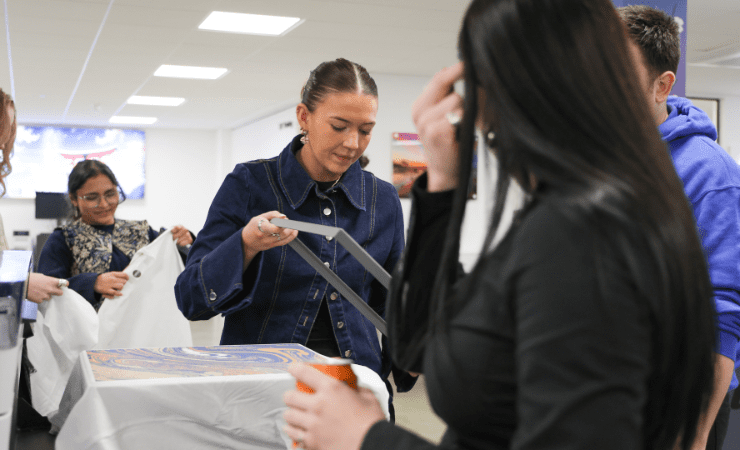Epson has celebrated the opening of its new innovation centre in Lutterworth, Leicestershire, by launching its first ever Textile Academy, a platform to inspire young people to contribute to a better, more eco-friendly textile industry.
The company’s inaugural Textile Academy event comprised of a one-day workshop for textile design students at nearby Nottingham Trent University (NTU). During this event, the students were given the opportunity to print individual designs onto substrates using Epson’s digital textile printing solutions spanning DTG, DTF (Direct To Film) and dye sublimation printers. An award for the design with the greatest creativity, colour, and impact, as determined by attending media, was given to Katy Harvey, in the form of a SureColor F100 dye-sublimation printer.
She said, ‘Today I learned about the different options for starting my own business or building my career through a company. It was also really great to see how my designs could work across such a wide range of items. Winning the competition for best design was really flattering, and I look forward to trying out my new printer at home.’
On the day students heard insights from Phil McMullin, head of sales for large format print at Epson; Oliver Mustoe-Playfair, co-founder at Prinfab; Taran Rai, sustainability manager at Epson; Polly Chapman, marketing manager at Epson; and April Holyome, head of product at 16Arlington, who spoke about the challenges, opportunities, and environmental implications of printing fashion.
Ms Rai commented, ‘The fashion sector receives a large spotlight in terms of its environmental footprint and today was a great chance to educate students on what this looks like. Epson has recently conducted research quantifying the water waste attributed to UK and European wardrobes through imported, analogue-printed garments, and it’s great to highlight the reduced impact of on-demand, digital textile printing.’
Mr Ferguson added that educating and inspiring students about the opportunities offered by digital textile printing future-proofs the industry and reduces water waste and CO2e. Marrying the student’s creativity with Epson’s technology is an exciting prospect, he concluded.

